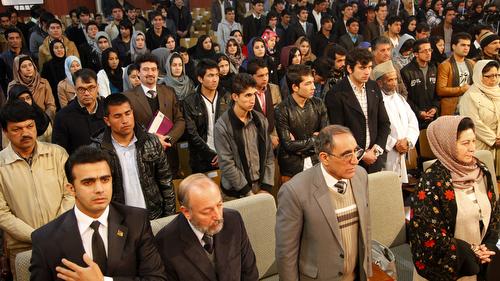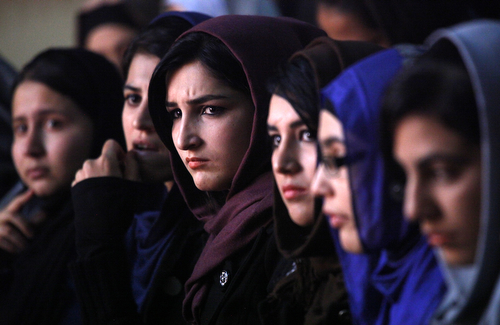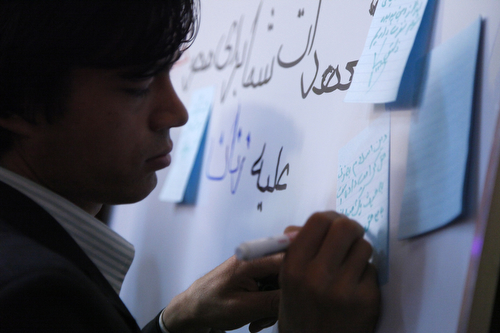KABUL - Hundreds of university students gathered in the Afghan capital of Kabul today for a colourful United Nations-backed event held to drive home to young people the importance of eliminating violence against women.“When we see the future, we see two important things: women and youth. They are the ones going to advance society; they are the ones who are going to help society to reach its full potential,” Fulya Vekiloglu, the Programme Manager of the UN Development Programme’s (UNDP) Gender Equality Project told the gathering at Kabul University.
“Unless and until they are given the full opportunity to exercise their capacity and participate fully in developing the nation, we cannot talk about development or peace,” she added.
With the support of UNDP, Kabul University held the event as part of its observance of International Students Day, which was first observed in 1941 in recognition of student activism. It commemorates the anniversary of the Nazi storming of the University of Prague in 1939, during which nine students were executed, another 1,200 were sent to concentration camps, and led to the closure of all Czech universities and colleges.
The theme chosen by Kabul University for this year’s observance was the “Elimination of Violence against Women.” The student activism observance coincides with the ongoing 16 Days of Activism Against Gender-Based Violence, an international campaign which through, the overlapping of key dates – such as the International Day for the Elimination of Violence against Women and International Human Right Day, which fall on 25 November and 10 December, respectively – symbolically links violence against women and human rights and aims to emphasize that such violence is a violation of human rights.
Violence against women is a serious issue in Afghanistan. More than 4,000 cases of violence against women and girls were reported by 33 of the country’s 34 provinces to the Ministry of Women’s Affairs in 2010-2012. In recent months Afghanistan has witnessed several cases of violence, including abduction and targeted killings by anti-Government elements aimed at female Government officials and public figures.
In her remarks to the event, UNDP’s Ms. Vekiloglu said that the UN agency actively supported efforts to empower youth globally because the “world today cannot overlook the potential, energy and vision that youth bring to establish sustainable development.”
She said that, in close collaboration with the Ministry of Women’s Affairs, UNDP’s Gender Equality Project worked with Kabul University for several years to establish a Gender Studies Institute at the educational institution. Now, efforts were underway to establish a master’s degree programme on gender studies, in partnership with Turkey’s Middle East Technical University of Ankara.
Ms. Vekiloglu noted that the elimination of violence against women would not only improve the lives of women in Afghanistan – it would also improve the country from an economic and social perspective.
The UNDP official highlighted that Afghan civil society and the authorities took a major step forward for women’s rights with the adoption of the law on the Elimination of Violence Against Women (EVAW). However, she added, women were still facing violence, both physical and in terms of their human rights.
In her comments to the gathered students, the Minister of Women Affairs, Hussn Banu Ghazanfar, appealed to all segments of Afghan society – including governmental and non-governmental organizations, and particularly religious scholars – to stand against traditions that, without any true connection to the religion of Islam, cause misery for Afghan women.
She said that the Ministry of Women’s affairs has benefitted from the influence of religious scholars to create public awareness of the importance of the elimination of violence against women, and on the legal and religious rights of women.
The Minister said that the upcoming Presidential and Provincial Councils’ elections, on 5 April next year, would be important for all members of Afghan society, but especially women, who could play a significant role in shaping the future of the country.
“I would like to call upon all the relevant institutions and Afghan families to pave the way for the full participation of women in the upcoming elections,” said Mrs. Ghazanfar.
Asides from the remarks delivered by the invited speakers, today’s event also featured musical and theatrical performances on the issue of gender equality, a presentation on gender equality and the screening of a short documentary on the EVAW law,
Enacted in August 2009 through a decree by Afghan President Hamid Karzai, the EVAW law criminalizes child marriage, forced marriage, selling and buying women for the purpose or under the pretext of marriage, ba’ad, forced self-immolation and 17 other acts of violence against women including rape and beating. It also specifies punishment for perpetrators.
UNAMA monitors progress on the implementation of the EVAW law. UNAMA’s report on its implementation in 2012 found that despite some progress in implementing the law, its application continued to be hampered by “dramatic under reporting” and lack of investigations into most incidents of violence targeting women. The next UNAMA report on the matter is expected to be released in the coming weeks.









